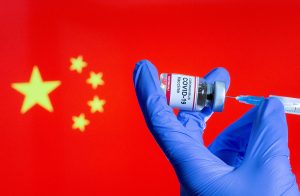SHENZHEN, China — Headhunter Candice knows the coronavirus disease 2019 (COVID-19) infections engulfing Beijing and much of China will soon hit her home of Shenzhen city, but she would rather face it without a vaccine booster, saying she fears potential side effects more than the virus.
The 28-year-old took two doses of Sinovac’s CoronaVac last year, hoping it would make travel easier, but she has since grown more skeptical, citing stories from friends about health impacts, as well as similar health warnings on social media.
“I don’t trust it,” she said, speaking on the condition that only her first name be used. Candice said she has refused to participate in recent vaccination drives organized by her local community.
Candice is part of a group that demonstrates how vaccine hesitancy still runs deep in mainland China, academics say, which poses a growing headache for Beijing as it tries to persuade more to get vaccinated in the face of a spike in infections after the lifting of strict anti-COVID measures.
Officially, China’s vaccination rate is above 90%, but the rate for boostered adults drops to 57.9%, and to 42.3% for people aged 80 and above, according to government data, prompting warnings that the country could see over 1.5 million deaths after lifting curbs such as lockdowns and mass testing that held most virus spread at bay.
In September, an article by a publication under the Chinese Center for Disease Control and Prevention (CDC) acknowledged coverage of older adults was poor, and that the absence of local doctors in vaccine drives, poor medical understanding and a lack of insurance for potential side effects all dampened enthusiasm.
“It’s a very special case in China because people felt very safe for a long time,” said Stephanie Jean-Tsang, an assistant professor at Hong Kong Baptist University who specializes in messaging around health.
“People need to realize what the risks are and how beneficial the vaccines are — it took time for Hong Kong citizens and the elderly to realize this as well.”
Authorities have not made vaccination mandatory amid signs that the public would push back against any such move. Last week China said it would start to offer a second booster — or fourth shot — for high-risk groups and people over 60 years old.
Overseas-developed vaccines are unavailable in mainland China to the general public, which has relied on inactivated shots by Sinopharm, Sinovac’s Coronavac and other domestically developed options for its vaccine rollout and which the medical community has found to be safe. It has also yet to introduce its own version of an mRNA vaccine.
While China’s medical community in general doesn’t doubt the safety of China’s vaccines, questions remain over their efficacy compared to foreign-made mRNA counterparts, said Kelly Lei, a doctor in the southern Chinese city of Shenzhen.
In late November, the hashtag “Sinovac vaccine counterfeit” surged to five million views on the Twitter-like Weibo platform, with many posts discussing lumps and hair loss allegedly caused by the locally made vaccine.
“At least a half of doctors and educated people wanted to get the mRNA ones and refused to get the Chinese ones,” Dr. Lei said.
“After a while, people see no hope and also they are kind of forced to get the Chinese ones, so they had to accept it. Some doctors talked to me, and said it’s useless anyway, why waste the money.”
Dr. Lei said many of her friends are looking to visit the neighboring Chinese territory of Macau, where mainlanders can receive mRNA vaccines.
Demand has surged in recent weeks, visitors to Macau say, with the online booking platform for vaccination showing no bookings available until Jan. 21.
But after jettisoning some of the world’s toughest anti-COVID curbs last week, China is now experiencing a wave of infections across the country, prompting some unable to travel to Macau or abroad to opt for the Chinese vaccines in desperation.
“In Guangzhou … things have started to get wild. They at least want something for some protection,” Dr. Lei said. — Reuters

